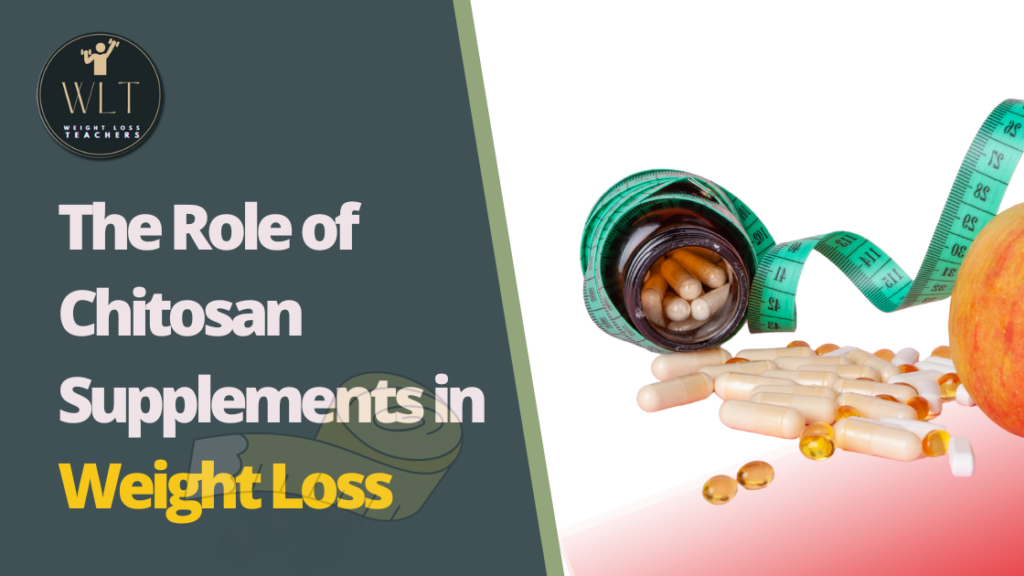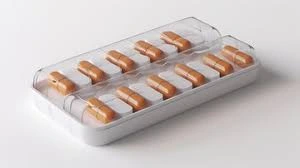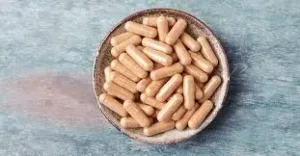
The Role of Chitosan Supplements in Weight Loss

Obesity is a global health epidemic, and millions of people are on a quest to shed excess pounds. While traditional weight loss strategies such as diet and exercise play a pivotal role in achieving weight management goals,
Table of Contents
Introduction
many individuals seek additional supplements to aid in their weight loss journey. One such supplement that has gained attention in recent years is chitosan. Chitosan is a natural polymer derived from chitin, a substance found in the shells of crustaceans like shrimp and crabs. This article delves into the science behind chitosan, its purported benefits for weight loss, and its potential risks and limitations.

Understanding Chitosan

Chitosan is a biopolymer derived from chitin, a natural substance that is abundant in the shells of crustaceans. Chitosan is formed through the deacetylation of chitin, a process that removes the acetyl groups from chitin molecules. The resulting chitosan is a white, odorless, and tasteless powder with various applications in industries such as agriculture, pharmaceuticals, and food processing.
Chitosan has been recognized for its unique properties, including its ability to bind with fats and other molecules. Its capacity to absorb fats has led to its exploration as a potential dietary supplement for weight loss. Chitosan supplements are available in various forms, such as pills, capsules, and powders, making them easily accessible to consumers.
Mechanism of Action: How Chitosan Aids in Weight Loss

Chitosan’s potential role in weight loss is primarily attributed to its unique fat-binding properties, making it a subject of interest for individuals striving to shed excess pounds. This mechanism of action, often referred to as “fat trapping” or “fat blocking,” is central to understanding how chitosan may assist in weight management.
Chitosan, a biopolymer derived from chitin, possesses a remarkable affinity for dietary fats, which are primarily composed of triglycerides. When chitosan is ingested as a supplement, it embarks on an intricate journey within the digestive system. Here’s how it works:
- Interaction with Dietary Fats: As chitosan travels through the digestive tract, it comes into contact with the dietary fats contained in the food we consume. These fats are typically found in various forms, such as cooking oils, butter, and the fats naturally present in many foods.
- Formation of Fat-Chitosan Complexes: The magic of chitosan unfolds as it interacts with these dietary fats. Chitosan molecules have a propensity to bind with the fats, resulting in the formation of what can be termed “fat-chitosan complexes.” These complexes represent a molecular amalgamation of chitosan and the dietary fats.
- Blocking Fat Absorption: The significance of these complexes lies in their size. They are created in such a way that they become considerably larger than the individual fat molecules. This altered molecular structure is too large for the body to absorb effectively.
- Passage Through the Digestive System: With their larger size, the fat-chitosan complexes are essentially blocked from being absorbed through the walls of the small intestine. This critical stage is where chitosan’s fat-binding property plays a pivotal role in its weight loss potential.
- Excretion from the Body: Since the complexes cannot be absorbed, they proceed through the digestive system and are eventually excreted from the body through the normal waste elimination process.
The result is that a portion of the dietary fats, due to their interaction with chitosan, does not contribute to the body’s calorie intake. This reduction in calorie absorption is considered a key element in the weight loss mechanism attributed to chitosan.
However, it is crucial to emphasize that the effectiveness of chitosan in promoting weight loss may not be uniform across all individuals. Several factors influence this process, including:
- Type and Amount of Dietary Fat: Chitosan’s effectiveness is closely tied to the type and quantity of dietary fats consumed. High-fat meals are more likely to provide greater opportunities for chitosan to interact with fats, potentially resulting in more noticeable effects.
- Individual Dietary Habits: An individual’s overall dietary habits, including the regular consumption of high-fat foods, will influence the frequency and extent of chitosan’s fat-binding activity. It is essential to recognize that chitosan is most effective when incorporated into a dietary plan that includes a significant amount of dietary fats.
Clinical Studies and Research

The use of chitosan supplements for weight loss has generated significant interest among researchers and health enthusiasts. Several clinical studies have investigated the effects of chitosan on weight management and body composition.
4.1. Reduction in Body Weight
Many studies have reported that chitosan supplementation can lead to a modest reduction in body weight. A meta-analysis of several clinical trials published in the journal “Obesity Reviews” in 2009 found that chitosan had a statistically significant effect on weight loss when compared to a placebo. The studies included in the analysis showed an average weight loss of approximately 3.7 pounds (1.7 kilograms) over the course of the trials.
It’s worth noting that while these findings are encouraging, the weight loss observed was relatively modest, and the long-term effects of chitosan on weight maintenance remain unclear.
4.2. Decreased Body Fat
Chitosan has also been studied for its potential to reduce body fat. A study published in the “Journal of the American College of Nutrition” in 2001 found that chitosan supplementation led to a decrease in body fat percentage in overweight and obese individuals. The participants who took chitosan experienced a significant reduction in body fat compared to those who received a placebo.
However, it’s essential to acknowledge that results from different studies can vary, and not all research supports the notion that chitosan is effective in reducing body fat.
4.3. Cholesterol Management
In addition to weight loss, chitosan has been studied for its potential to improve cholesterol levels. Some research suggests that chitosan may help lower LDL cholesterol (commonly known as “bad” cholesterol) levels by binding to dietary cholesterol and preventing its absorption. This effect could have implications for cardiovascular health, as high LDL cholesterol levels are associated with an increased risk of heart disease.
A study published in the “European Journal of Clinical Nutrition” in 2017 found that chitosan supplementation resulted in a significant reduction in LDL cholesterol levels. However, more research is needed to fully understand the extent and consistency of this effect.
Benefits of Chitosan for Weight Loss

The use of chitosan supplements for weight loss has been a subject of interest among both researchers and individuals seeking effective weight management strategies. While the scientific evidence surrounding chitosan’s impact on weight loss is not entirely conclusive, several potential benefits have been identified, making it a notable consideration for those on a weight loss journey.
5.1 Fat Absorption
One of the key advantages of chitosan supplementation is its ability to interact with dietary fats. Chitosan’s molecular structure enables it to form bonds with fats, such as triglycerides, in the digestive system. When chitosan is ingested alongside a meal, it acts as a “fat trap” by binding to dietary fats and preventing their absorption in the small intestine.
This fat-binding property of chitosan is particularly beneficial for individuals who consume high-fat diets. People following diets rich in fats often struggle to control their calorie intake, as fats are calorie-dense nutrients. By reducing the absorption of fats, chitosan can help create a caloric deficit, which is a fundamental principle for weight loss.
In practical terms, this means that the calories from fat that are typically absorbed by the body are, to some extent, “trapped” by chitosan and eliminated from the body through the digestive process. Over time, this reduced calorie absorption can contribute to gradual weight loss.
5.2 Reduced Caloric Intake
Weight loss primarily revolves around the concept of calorie balance—when you consume fewer calories than your body expends, you are likely to lose weight. Chitosan can be an effective tool in this regard. By decreasing the absorption of dietary fats, chitosan leads to a reduction in calorie intake without requiring individuals to significantly alter their diets.
This property of chitosan is especially advantageous for those seeking to create a calorie deficit. For individuals who have difficulty reducing their portion sizes or adopting a low-fat diet, chitosan can offer an additional means of controlling caloric intake.
It’s important to note that while chitosan can assist in reducing calorie intake, it is most effective when used in conjunction with a balanced diet and regular physical activity. Weight loss remains a complex process influenced by multiple factors, including diet quality, physical activity, and individual metabolism.
5.3. Cholesterol Management
Chitosan’s impact on weight loss extends beyond calorie control. It has also been investigated for its potential to improve cholesterol levels, particularly in the context of managing low-density lipoprotein (LDL) cholesterol, often referred to as “bad” cholesterol.
High LDL cholesterol levels are associated with an increased risk of cardiovascular diseases, including heart disease and stroke. When chitosan binds to dietary fats in the digestive system, it not only reduces calorie absorption but can also lower the absorption of cholesterol. This has implications for heart health, as lowering LDL cholesterol levels can have a positive impact on overall cardiovascular well-being.
The ability of chitosan to address cholesterol management adds another layer of potential benefits for individuals considering its use. By improving cholesterol profiles, it not only contributes to better heart health but also indirectly supports weight loss. This dual benefit makes chitosan an attractive option for those who want to address both their weight and their cardiovascular health.
5.4 Minimal Side Effects
Chitosan is generally considered a safe and well-tolerated supplement, with few reported side effects. This makes it an appealing option for individuals seeking weight loss supplements. Unlike some weight loss products that may come with a range of adverse effects, chitosan is generally well-received by those who use it.
Common side effects of weight loss supplements can include jitteriness, rapid heartbeat, digestive discomfort, or even more serious health concerns. Chitosan, on the other hand, is typically gentle on the body and digestive system, reducing the risk of unpleasant side effects.
This safety profile contributes to the appeal of chitosan, as it allows individuals to explore weight loss options without the fear of experiencing adverse reactions. However, it’s important to note that while side effects are minimal, individual responses to supplements can vary, and consulting with a healthcare professional before starting any supplement regimen is always advisable.
Note: There might be affiliate links mentioned here. We may receive a commission if you purchase a product through an affiliate link. There is no additional charge for you. Please do your own research before making any online purchases.
Limitations and Considerations

Before considering chitosan supplements for weight loss, it’s important to be aware of some of the limitations and considerations associated with their use:
6.1 Variability in Results
The effectiveness of chitosan may vary from person to person. Factors like diet, overall caloric intake, and the type of fats consumed can influence its fat-binding capacity. Therefore, chitosan may not yield consistent results for everyone.
6.2 Modest Weight Loss
Chitosan’s impact on weight loss is generally modest. While it can contribute to gradual weight reduction, it is not a magic solution for rapid or substantial weight loss.
6.3 Dietary Habits
Chitosan’s efficacy is closely tied to an individual’s dietary habits. A balanced diet with appropriate portion sizes and exercise remain fundamental components of a successful weight loss plan. Chitosan should be viewed as a complementary measure rather than a standalone solution.
6.4 Not a Miracle Cure
It’s important to understand that chitosan is not a miracle cure for obesity or weight-related health issues. Weight loss is a complex process influenced by numerous factors, including genetics, lifestyle, and overall health. Chitosan should be considered as just one piece of the puzzle.
6.5 Potential Side Effects
While chitosan is generally well-tolerated, some individuals may experience mild gastrointestinal side effects, such as bloating, gas, or diarrhea. It is advisable to consult a healthcare professional before starting any supplement regimen, especially if you have preexisting medical conditions.
Recommendations and Precautions

If you are interested in trying chitosan supplements for weight loss, it is essential to approach them with caution and make informed decisions. Here are some recommendations and precautions:
7.1 Consult a Healthcare Professional
Before starting any new supplement regimen, including chitosan, consult with a healthcare professional, such as a registered dietitian or physician. They can provide personalized guidance based on your health and weight loss goals.
7.2 Use Chitosan as a Complement
Chitosan should be used as a complement to a balanced diet and regular exercise, not as a standalone solution. Focus on adopting a healthy lifestyle that includes mindful eating and physical activity.
7.3 Read Labels Carefully
When choosing chitosan supplements, read the product labels to ensure you are selecting a reputable brand with appropriate dosages and ingredient purity.
7.4 Monitor for Side Effects
Keep an eye out for any adverse reactions or side effects when using chitosan. If you experience discomfort or gastrointestinal issues, discontinue use and consult a healthcare professional.
7.5 Be Realistic About Expectations
Manage your expectations regarding the potential weight loss benefits of chitosan. Remember that it is not a miracle cure, and any results may be modest.
FAQs (Frequently Asked Questions)
Q1. What is chitosan, and how does it relate to weight loss?
A1. Chitosan is a natural polymer derived from chitin, a substance found in crustacean shells. It’s believed to aid in weight loss due to its fat-binding properties, which reduce the absorption of dietary fats and calories, contributing to weight management.
Q2. How does chitosan work in the body?
A2. Chitosan interacts with dietary fats in the digestive system, forming fat-chitosan complexes that are too large for the body to absorb. These complexes pass through the digestive system and are eventually excreted, reducing the effective calorie intake.
Q3. Is chitosan a “fat trap” or a “fat blocker”?
A3. Chitosan is often referred to as both a “fat trap” and a “fat blocker” because it traps dietary fats by forming complexes too large for absorption, effectively blocking their uptake by the body.
Q4. What types of dietary fats does chitosan interact with?
A4. Chitosan interacts with various forms of dietary fats, including those from cooking oils, butter, and fats naturally present in foods.
Q5. How does chitosan contribute to weight loss without altering one’s diet?
A5. Chitosan reduces the absorption of dietary fats, creating a caloric deficit without requiring significant dietary changes. It can help individuals who find it challenging to reduce their portion sizes or adopt low-fat diets.
Q6. Are the weight loss effects of chitosan consistent among all individuals?
A6. No, the effectiveness of chitosan varies among individuals and depends on factors like the type and amount of dietary fat in one’s diet and their overall dietary habits.
Q7. Can chitosan help lower cholesterol levels?
A7. Chitosan has been studied for its potential to lower LDL cholesterol levels, also known as “bad” cholesterol, by preventing the absorption of dietary cholesterol.
Q8. Are there any side effects associated with chitosan supplementation?
A8. Chitosan is generally well-tolerated, with few reported side effects. However, some individuals may experience mild gastrointestinal issues like bloating, gas, or diarrhea.
Q9. Is chitosan a miracle cure for obesity or rapid weight loss?
A9. No, chitosan is not a miracle cure. It should be viewed as a complementary tool within a broader weight management strategy, which includes a balanced diet and regular exercise.
Q10. What precautions should I take when considering chitosan supplements for weight loss?
A10. Consult a healthcare professional before starting chitosan supplements, use them as a complement to a balanced diet and exercise, read product labels carefully, monitor for side effects, and maintain realistic expectations regarding weight loss results.
Conclusion
Chitosan supplements have gained attention for their potential role in weight management due to their ability to bind with dietary fats and reduce fat absorption. While there is evidence to suggest that chitosan can contribute to modest weight loss and improved cholesterol levels, it is not a magic solution for obesity or excessive weight gain.
Individuals considering chitosan supplements should do so with caution, understanding that their effectiveness may vary from person to person. Chitosan should be viewed as a complementary measure within the context of a healthy lifestyle that includes a balanced diet and regular exercise.
As with any dietary supplement, it is crucial to consult with a healthcare professional before incorporating chitosan into your weight loss plan, ensuring that it aligns with your overall health and fitness goals. Ultimately, successful weight management is a holistic endeavor that involves multiple factors, and while chitosan may play a role, it is not a standalone solution to the complex issue of obesity and weight loss.
Disclaimer: The information provided in this article is for educational purposes only and should not be considered as a substitute for medical advice. Consult a healthcare professional before implementing any home remedies or making significant changes to your lifestyle.






